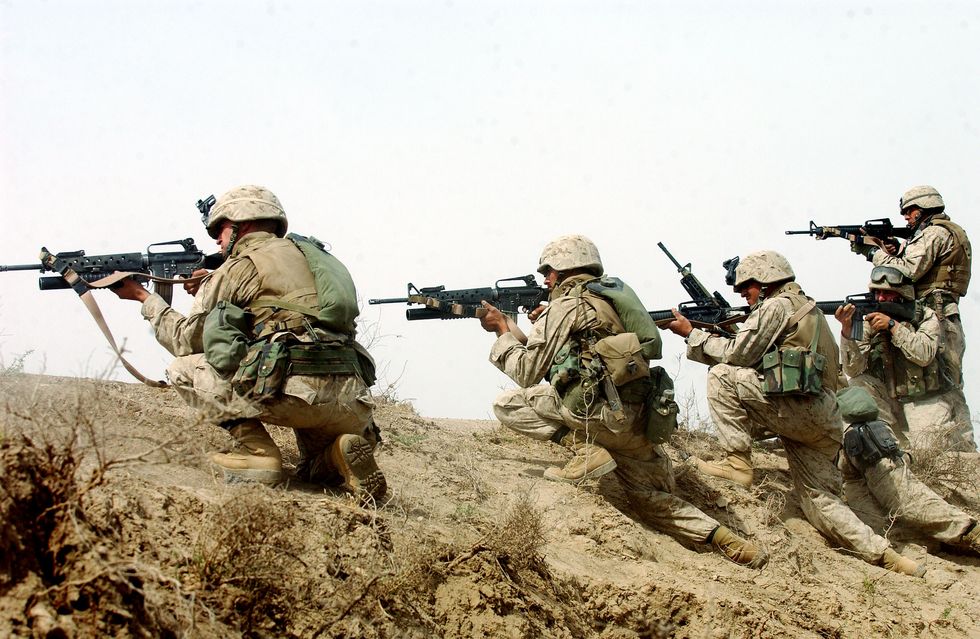In the past 100 years the United States has had many examples of why and how we fight. I will be briefly outline three major examples of our history’s fight in United States operations and wars and the lessons they have shown us today. By using examples of: World War II, The Bay of Pigs, and the Iraq War. World War II being the first to set the global stage for the use of nuclear weapons, The Bay of Pigs namely for ideological reasons, and the Iraq War for the results of action in imposing democracy. The failures and mistakes from our past history can hopefully give us the lessons and success needed for the future of American warfare.
World War II
The United States in World War II had shown the world our military capabilities and truly proved that we were a global superpower. While at war in the European Theater and in the Pacific we had ample military technology development for its time. One of those technological advances being the atomic bomb. President Truman decided to authorize the military nuclear bombings on Japan of August 1945. The Japanese cities of Hiroshima and Nagasaki were decimated. While this was effective with Japan surrendering in the war, it tragically leaves us the lesson of the general uses of nuclear powers and what is allowed and not allowed in international laws or treaties. Regarding today’s foreign policy, it is a powerful lesson because we do not want to go to the measures of another war – essentially a “World War III”. The development of nuclear weapons since that time has left other countries with the same opportunity to strive for and achieve advancements in developing their own nuclear weapons. The former Soviet Union (Russia), the United Kingdom, China, France, and the United States are nuclear weapon states and are under the agreement of the “Treaty on the non-Proliferation of Nuclear Weapons”. Other countries such as North Korea, Iran, and Pakistan (to name a few) have also conducted nuclear weapons tests; these countries are to be considered some of the riskiest countries to obtain nuclear power. According to the United Nation’s website it states that the countries under the agreement of the “Treaty on the non-Proliferation of Nuclear Weapons”, is designed to limit nuclear weapons in warfare, as quoted:
“A landmark international treaty whose objective is to prevent the spread of nuclear weapons and weapon technology, to promote cooperation in the peaceful uses of nuclear energy and to further the goal of achieving nuclear disarmament and general and complete disarmament.”- UNODA (United Nations Office for Disarmament Affairs).
Had it not been for the bombings on Japan by the United States toward the end of World War II, then the rules of nuclear weapons worldwide may not be here presently for the safety of humanity. Understanding the seriousness of nuclear weapons and trying to elude the use of them is necessary for the future of not only the United States but the possible chaos it could cause in the global sphere.
The Bay of Pigs
In 1961, under the decision of President John F. Kennedy, the continued policies of his predecessor (Dwight Eisenhower), and the devised plan by the Central Intelligence Agency (CIA), we had seen the invasion of “The Bay of Pigs”. This operation was done by the United States to try to overthrow the communist regime of Fidel Castro after Castro had overthrown the leader at the time, dictator Fulgencio Batista, and the Cuban government in 1959. The United States’ plan was to use Cuban exiles to fight against the fairly new communist Cuban government in order to regain control of their country again from the ideology of communism. Without using direct American action in trying to influence an anti-Castro movement, we thought using the exiles would be a much better plan. Although the CIA trained the exiles and provided them the tools required in order to overthrow the government clandestinely, it was far from a secret. Fidel Castro allegedly already knew of the United States plan to invade but that was only part of the complications of the guerilla warfare. The operation ultimately failed when the exiled fighters surrendered in less than a day and nothing was changed in the country. For many reasons this failure was a lesson to be learned today.
The biggest reason though was our stance on fighting communism. We were fighting against an ideology, that is something that we cannot truly control or come to common grounds with. We have seen this many times throughout history throughout the entire period of the Cold War and can even be seen today with our fight against ISIS – there is no way to compromise because it is solely based on beliefs. For the future we need to keep in mind that while fighting, although diplomacy is what needs to be considered first, if that is unattainable we must take necessary actions to tactfully fight. With fighting against ideology we must determine if it is a threat to our nation or not. If it is the latter, then the decision to not take any action if there are no threats or vital interests we should be fighting for should be heavily debated on for the sake of our United States military. In other words, in fighting ideology there is no other recourse so we must carefully make decisions regarding the severity and consequences of going to war (ex. communism vs. terrorism ideologies). The Bay of Pigs was a failed operation.
The Iraq War
During our mission in the Iraq War under President Bush’s administration, invading Iraq was based on the supposed idea of ‘Weapons of Mass Destruction’, and essentially leading to the take out of the brutal dictator Saddam Hussein. By removing Saddam Hussein out of power we had thought that we would develop a process of regaining some sense of normalcy in Iraqi society, by trying to impose democratic ideals to Iraq, and that it would be achieved very quickly. A country who had previously only known what life was like under a dictatorship was suddenly trying to be reformed in a blink of an eye under what was called: Operation Iraqi Freedom. This led to many challenges and problems that arose out of the Iraq War. Although we successfully removed Saddam Hussein from power we also had removed his Ba’athist Party regime completely out of power as well. While this may seem that it was a good idea, it actually was counterproductive. Saddam Hussein tortured and imprisoned his own people and for the U.S. to step in for humanitarian reasons was an achievement in the human rights perspective.
While we had captured and handed Hussein to the Iraqi Special Tribunal, who then sentenced him to death, we then looked forward to democracy in Iraq. It was an appreciable act, but we did not fully think through our strategy with what will come next out of Iraq. Planning out and knowing your next action is something that in war we imagine is an easy task; but situations in war can change constantly. One plan for sure is that by removing Hussein and his regime out of power, we should have thought of how we were going to impose this democracy and what we were going to do about the “empty seats” in the Iraqi government that was in place at the time. The vacuum allowed terrorist groups today to rise up and use to their advantage the empty government in terrorizing the country. By eliminating the government with nothing else to put in place creates more disaster, which is something in future wars we should be aware of. By imposing our belief of democracy onto the Iraqi’s was much harder than expected and has made many wonder if imposing those ideas of democracy and constitutions were something that was possible for this Middle Eastern country.
Overall
Going to war is not an easy decision and a lot of consideration should be taken into account in doing so. If we take some of the lessons we have learned from our past military history, it could possibly help us in future combat. The lessons of the detrimental effects of nuclear weapons in the instance of World War II, the unreasonable fight against ideologies in the case of the Bay of Pigs operation, and our attempt to thrust democracy onto an unstable Middle Eastern country such as Iraq can help us in the future. If we learn that nuclear weapons are a very serious weapon and should be used in the instance of security and not to promote violence we can successfully feel safe with our place in the world being the superpower that we are. If we take the lesson of not fighting off ideologies that are different than ours as long as they do not constitute a threat to us, then we can save ourselves from an unnecessary conflict. Lastly, we can learn that having a plan of action if we are going to try promoting democratic ideals to other countries is essential in order to be successful; if its incapable of doing so then we should not try to influence others and let it be. Of course, as stated before the world and ways of war can change at any point in time, but if we at least take some tips from our past to shape the future endeavors on how and why we fight wars it will make America stronger and continue to grow stronger for the destiny of generations to come.





 Going to the cinema alone is good for your mental health, says science
Going to the cinema alone is good for your mental health, says science












 women in street dancing
Photo by
women in street dancing
Photo by  man and woman standing in front of louver door
Photo by
man and woman standing in front of louver door
Photo by  man in black t-shirt holding coca cola bottle
Photo by
man in black t-shirt holding coca cola bottle
Photo by  red and white coca cola signage
Photo by
red and white coca cola signage
Photo by  man holding luggage photo
Photo by
man holding luggage photo
Photo by  topless boy in blue denim jeans riding red bicycle during daytime
Photo by
topless boy in blue denim jeans riding red bicycle during daytime
Photo by  trust spelled with wooden letter blocks on a table
Photo by
trust spelled with wooden letter blocks on a table
Photo by  Everyone is Welcome signage
Photo by
Everyone is Welcome signage
Photo by  man with cap and background with red and pink wall l
Photo by
man with cap and background with red and pink wall l
Photo by  difficult roads lead to beautiful destinations desk decor
Photo by
difficult roads lead to beautiful destinations desk decor
Photo by  photography of woman pointing her finger near an man
Photo by
photography of woman pointing her finger near an man
Photo by  closeup photography of woman smiling
Photo by
closeup photography of woman smiling
Photo by  a man doing a trick on a skateboard
Photo by
a man doing a trick on a skateboard
Photo by  two men
two men  running man on bridge
Photo by
running man on bridge
Photo by  orange white and black bag
Photo by
orange white and black bag
Photo by  girl sitting on gray rocks
Photo by
girl sitting on gray rocks
Photo by  assorted-color painted wall with painting materials
Photo by
assorted-color painted wall with painting materials
Photo by  three women sitting on brown wooden bench
Photo by
three women sitting on brown wooden bench
Photo by 
 Photo by
Photo by  Photo by
Photo by  Photo by
Photo by  Photo by
Photo by 


 people sitting on chair in front of computer
people sitting on chair in front of computer











